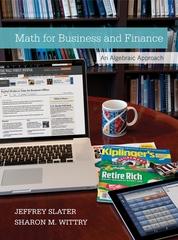Question
UTILIZE THE CASE STUDY BELOW TO ANSWER THE QUESTION ob applicants usingAngelList Talent, the largest online recruitment platform for private and entrepreneurial companies in the
UTILIZE THE CASE STUDY BELOW TO ANSWER THE QUESTION
ob applicants usingAngelList Talent, the largest online recruitment platform for private and entrepreneurial companies in the United States, began shifting their job searches to larger firms after federal officials declared a national state of emergency on March 13 due to COVID-19. Experienced and higher-quality talent were among those fleeing to large companies, leaving young startups with a smaller and lower-quality pool of talent to draw from, write the authors of a recent working paper titledFlight to Safety: How Economic Downturns Affect Talent Flows to Startups(pdf).
This has important implications, saysShai Bernstein, an associate professor of business administration in the Entrepreneurial Unit at Harvard Business School, who coauthored the study. "[It] means not only that the pool of potential human capital for startup companies began declining when COVID started, but also that the quality of the pool has deteriorated," he says. "The incumbent [companies], just by nature of having more cash or by being more established, are perceived safer during the crisis, and suddenly have a unique advantage in terms of attracting talent."
Bernstein teamed up with Richard R. Townsend from the University of California San Diego and Ting Xu from the University of Virginia to study nearly 84,000 job applicants who were active on the AngelList platform between February 5 and June 18, 2020.
Researchers used the number of years a candidate has spent in their current role, as well as a proprietary score created by AngelList that includes experience, education, skills, and job area to categorize a job seeker as having high-quality talent.ob applicants usingAngelList Talent, the largest online recruitment platform for private and entrepreneurial companies in the United States, began shifting their job searches to larger firms after federal officials declared a national state of emergency on March 13 due to COVID-19. Experienced and higher-quality talent were among those fleeing to large companies, leaving young startups with a smaller and lower-quality pool of talent to draw from, write the authors of a recent working paper titledFlight to Safety: How Economic Downturns Affect Talent Flows to Startups(pdf).
This has important implications, saysShai Bernstein, an associate professor of business administration in the Entrepreneurial Unit at Harvard Business School, who coauthored the study. "[It] means not only that the pool of potential human capital for startup companies began declining when COVID started, but also that the quality of the pool has deteriorated," he says. "The incumbent [companies], just by nature of having more cash or by being more established, are perceived safer during the crisis, and suddenly have a unique advantage in terms of attracting talent."
Bernstein teamed up with Richard R. Townsend from the University of California San Diego and Ting Xu from the University of Virginia to study nearly 84,000 job applicants who were active on the AngelList platform between February 5 and June 18, 2020.
Researchers used the number of years a candidate has spent in their current role, as well as a proprietary score created by AngelList that includes experience, education, skills, and job area to categorize a job seeker as having high-quality talent.ob applicants usingAngelList Talent, the largest online recruitment platform for private and entrepreneurial companies in the United States, began shifting their job searches to larger firms after federal officials declared a national state of emergency on March 13 due to COVID-19. Experienced and higher-quality talent were among those fleeing to large companies, leaving young startups with a smaller and lower-quality pool of talent to draw from, write the authors of a recent working paper titledFlight to Safety: How Economic Downturns Affect Talent Flows to Startups(pdf).
This has important implications, saysShai Bernstein, an associate professor of business administration in the Entrepreneurial Unit at Harvard Business School, who coauthored the study. "[It] means not only that the pool of potential human capital for startup companies began declining when COVID started, but also that the quality of the pool has deteriorated," he says. "The incumbent [companies], just by nature of having more cash or by being more established, are perceived safer during the crisis, and suddenly have a unique advantage in terms of attracting talent."
Bernstein teamed up with Richard R. Townsend from the University of California San Diego and Ting Xu from the University of Virginia to study nearly 84,000 job applicants who were active on the AngelList platform between February 5 and June 18, 2020.
Researchers used the number of years a candidate has spent in their current role, as well as a proprietary score created by AngelList that includes experience, education, skills, and job area to categorize a job seeker as having high-quality talent.
Question 3
1. An intensification in amount _____ the charge and _____ the measure necessitated.
2. A manufacturer prospect ought to be_________ accepted if it has _____ net contemporary value
3.In a monopolistic competition,____________ a business obtains its maximum-profit position where_________
4. The important perception of Economics___________ about possessions is that the possessions are___________
5. Consider a world without scarcity of resources__________. Then what would be the consequences____________?
6.Who is well-thought-out the _________originator of Microeconomics____________
7. Who is considered the founder of modern Macroeconomics?
8. When investigating the impact of a adjustable__________ on the commercial classification, the other things___________
9. Inputs are collective with knowledge to produce productivities__________. The important inputs (also called factors of construction) are________--
10. Goods fashioned_________ to produce yet supplementary personal property is called____________
Step by Step Solution
There are 3 Steps involved in it
Step: 1

Get Instant Access to Expert-Tailored Solutions
See step-by-step solutions with expert insights and AI powered tools for academic success
Step: 2

Step: 3

Ace Your Homework with AI
Get the answers you need in no time with our AI-driven, step-by-step assistance
Get Started


